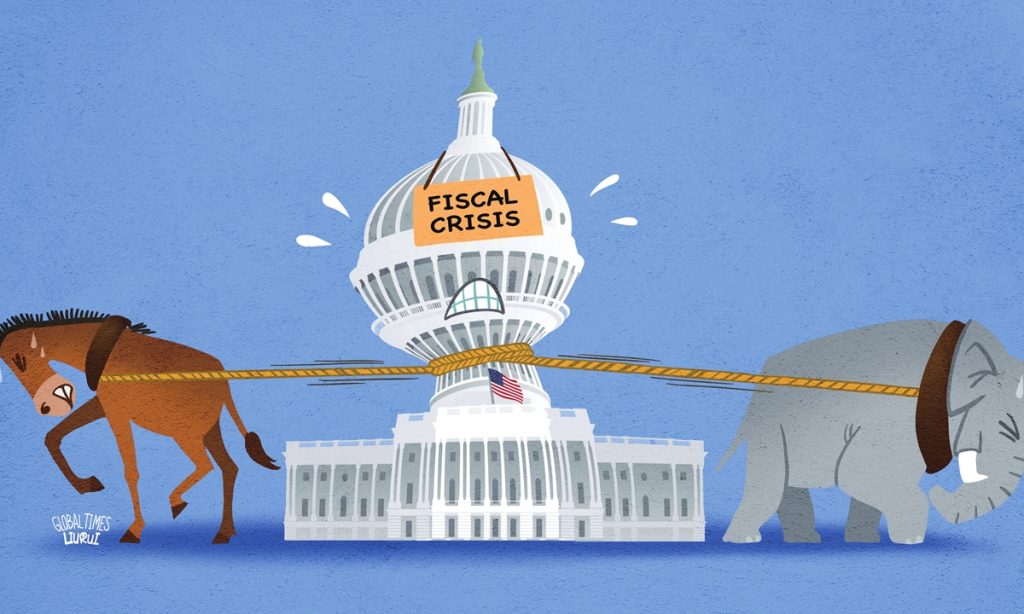Political decay in Washington laid bare as government shutdown abused as bargaining chip

Facing the arrival of the new fiscal year on October 1, the US Congress has yet to pass a budget for the federal government. The US government is once again facing a "shutdown" crisis due to a lack of funds. The US partisan divide has also exposed an increasingly polarized "ugly side" as the deadline approaches.
Although the US federal government has experienced multiple shutdowns in its history due to debt and budget issues, the divergences between the two parties are more pronounced this time. According to the Associated Press, there is "a gulf between the chambers that could prove difficult to bridge." This situation could potentially lead to another damaging government shutdown in the US. Hakeem Jeffries, House Democratic leader from New York, made the accusation that "House Republicans have made it clear that they are determined to shut down the government and try to jam their extreme right-wing ideology down the throats of the American people." Republican Congressman Tom Cole dismissed the chaos in the House as "the chaos of democracy."
Diao Daming, deputy director of the Center for American Studies at Renmin University of China, told Global Times that, against the backdrop of polarization in US politics, both parties no longer see a government shutdown as a crisis but rather as a bargaining chip with which to threaten each other.
Ni Feng, director of the Chinese Academy of Social Sciences' Institute of American Studies, told Global Times reporters, the annual government shutdown drama has become one of the means for two parties to attract public attention. The government shutdown is a way for the two parties in the US to try to force each other to compromise and achieve their political goals through extreme measures. While causing a government shutdown will inevitably invite criticism, the two parties are even less willing to confront their political failure.
If the House and Senate fail to reach a compromise before October 1, the Republicans may face even more criticism. Republican lawmakers have stated that the message from Kevin McCarthy is clear: "We will be losers if we get a shutdown."
However, this does not mean that the current ruling party will be spared from difficulties. A government shutdown would directly lead to the shutdown of US public services, and a prolonged government shutdown would also impact the economy. By then, the Biden administration would also bear the blame. In the end, a government shutdown will only result in both parties losing. The government will not be able to fulfill its functions and respond to the demands of society and the people. The government shutdown crisis has become a tool for the two parties in the US to pursue their own interests. Diao believes that this is a manifestation of political dysfunction and governance failure in the US.
Ni believes that for the current US government, the issue of fiscal balance cannot be resolved. Congress has long struggled to pass spending bills on time, according to Pew Research Center. The US government often faces a shutdown crisis or regularly buys itself extra time by relying on continuing resolutions. Continuing resolutions typically extend funding levels from the prior fiscal year, but only for existing programs.
Fiscal appropriations inevitably involve almost all political issues, making fiscal matters a focal point of dispute between the two parties. Diao said that according to the current fiscal appropriation process implemented in the US, there is only about a month each year to discuss whether to pass relevant agendas. This means that the already time-constrained and heavy task of fiscal appropriations cannot be achieved as scheduled due to the increasingly polarized struggle between the two parties. Although the House and Senate may avoid a government shutdown through short-term continuing resolutions, the recurring shutdown crisis each fiscal year proves that the US system is only treating the symptoms and not the root cause, and political decay is becoming increasingly evident.
In the face of a government shutdown crisis, both parties have not contributed to effectively resolving the problem. Their goals are not to make efforts to avoid the crisis but to use the crisis to engage in partisan struggles and achieve their policy agendas. From historical experience, the Donald Trump administration's spending issues and the Barack Obama administration's implementation of healthcare reform have both led to government shutdowns. The farce playing out in Washington will further polarize the radical supporters of both parties and further irritate the swing voters. Although the current government shutdown crisis may not directly impact the US 2024 election situation, it cannot hide the trend of further division in American society. The remaining trace of self-governance and democracy in the US will also be eroded under the ugly polarization of US partisan struggles.


